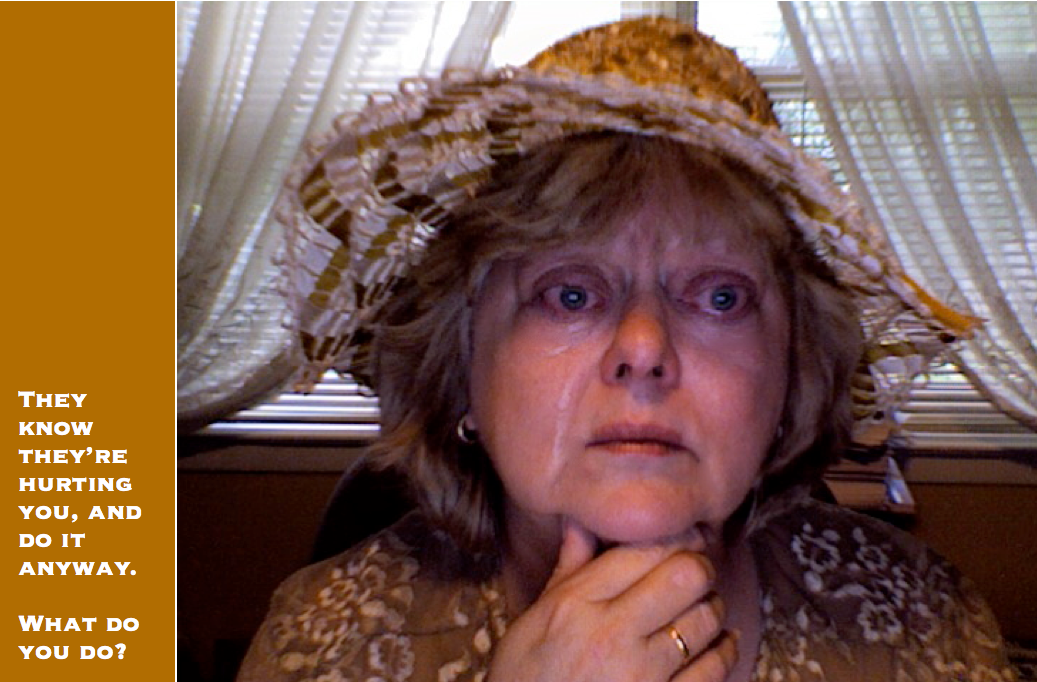Today is the 25th anniversary of my dad’s beginning his eternal journey. And as others become aware of this, and that he and the date remain fresh in my memory, I’m asked, “How long do we grieve?”
There’s a ton of expert advice on this on the net and through professional counselors, of course, so I see no sense in repeating that here. What I would like to talk about is the tangential things come with grief that significantly impact us. Some of those professionals talk about the seven stages of grief, and I do think there’s benefit in knowing them. It’s easy to spot where you are on the list–if you look at it and do your best to be honest and objective.
That’s not the part I wanted to talk about. What I want to talk about is the realizations that come with grief. I don’t know, maybe I’m odd, but until I suffered the loss of my dad, I didn’t spend a lot of time thinking about death and dying. Oh, I was familiar with death and dying. I planned my first funeral, for my brother, when I was thirteen. It isn’t that I wasn’t aware, I just didn’t dwell on death or dying, I dwelled on living. In fact, I was so immersed in life, I gave little thought to dying or death until I got smacked in the face with it.
Now there’s death and then there’s death. The transient death is one that doesn’t have a direct impact on our lives. An example: a boy in high school died when fixing a flat. Impacted but not long-term direct impact. A girl had a ruptured cyst and died. Again, impact (I had seen her often at school) but not long-term direct impact. You still are shocked, you still grieve, but then you re-immerse in life and go on. You recall them from time to time but your world isn’t rocked.
When you lose a parent, however, your world is rocked. Hard. And it rocks like a cradle for a very long time. Oh, you go through the shock and you grieve, but from that day forward in a thousand little ways and all of the big ones, you think of that parent and how your world was shaped by them and what a gaping wound is in your life with them having moved on.
You hit all of the seven stages of grief, and you might be stuck in one of them for an extended period of time. Or you might cruise through 3 or 4 and then get stuck. Some stay stuck. Some work through that stage and move forward. Moving forward is definitely healthier and, bluntly put, a parent who loved you wouldn’t want you stuck forever grieving. That parent would want you loved and loving and content.
Many believe that Christians are exempt from the ravages of grief because they have faith. I’m not one of them. I have faith. I grieved. I still grieve. I’m not alone.
I still miss my dad. He was my hero. I wanted to be like him: smart and wise and funny and compassionate and caring. I wanted to take all the things I so respected and admired in him and become them. I wanted him to be glad I was his daughter. To be proud. I wanted to earn his respect and keep it.
All little girls want those things. Just as all little boys want specific things. When he was here, I worked at them. Now that he’s gone, I work harder for them. Realizing that surprised me. But I’ve learned something in the quarter century since his passing. Something important.
We don’t really ever stop grieving. We just get better at coping with it.
He lives in my memories and my heart. He lives when I share with my kids or grands his bits of wisdom and those gems that are passed down. And he will continue to live when they pass those bits of wisdom and those gems down to their kids and grands.
Some are heartbroken at realizing–and on the other side of the hardest hitting grief, you do reach a point where you realize this–that we’re two generations away from being forgotten. Our grands won’t know our parents and all the wonderful things we learned from them. They will know what we share. But too soon those things too will be forgotten or reassigned to those who directly impact them. We’ll go home, they’ll go home, and then those generations will be caught up in living their lives and being touched by death and dying that doesn’t impact them directly or that which does and influences them. This is the way of things. The circle of life. And it’s normal so it’s nothing to be sad about.
But being aware of it, we might want to really think about the things that matter. Life is short. Eternity lasts a long, long time.
Some say you should grieve a year. Sorry, but I find that amusing. As if putting a date on a calendar could ever change what’s in the heart. Doesn’t happen that way. The straight skinny is that much in how you react to the death of someone you love depends on what you’re taught should be your reaction–and whether you accept or reject that teaching–and on what you think happens after death.
You mourn the loss of that person in your life. But if you know that person is no longer in pain, is going to heaven, you know they’re okay. That person, to you, didn’t leave home, s/he is going home. So you grieve because you’ll miss him/her but you know one day, when you go home, you’ll see him/her again.
So you grieve and adjust, and eventually find you can smile again and that you’re not crawling in a black hole of despair but peeking sunlight and feeling again. No longer numb, you feel, and while the ache is there, you’re not all ache. You live, and when you laugh again, you might feel a little guilty, but a day comes when you don’t feel guilty. You just laugh. And live. You don’t forget, but you accept and you live.
From my seat, I say, you grieve hard until you’re ready to let life back into your world. When you do, you’ll struggle with it, but eventually you find your way, and one day you laugh. That’s the beginning of moving on.
You’ll bring your departed with you in ways you expect and ones you don’t. You’ll cry less and remember with an abiding fondness more. You’ll recall precious moments, and embarrassing ones, and humiliating ones where you weren’t your best and all will be treasured. And along about year five or so, you’ll stop just breathing in and out and start working to remember special moments. And when you do, you’ll spot little things you never noticed when those things happened. Extra efforts made for you. Protections. Sacrifices. And that will create more treasures.
Somewhere along the line, a shift occurs and all these new insights mingle with the others and settle in. You’ve made peace with the death.
I frankly don’t know how people endure grief without faith. Maybe I lack a gene or something. Or the strength. I’m not sure, but I can’t imagine it. What I am sure of is that when I thought I couldn’t bear it, I’d hit my knees, and discover I could. When I felt alone and a little lost, I’d pray and feel connected and comforted. When I needed guidance and direction, I’d open my Bible and unfailingly find exactly what I needed. That is what I know.
Can you grieve loss of any kind without God? Yes.
But I never want to do it. Ever. I’m not that brave or that strong.
The last words my dad said to me just minutes before his death were, “God bless.”
He has. And those two words have carried me through grief and let life back into it. I remember, and miss, and am grateful.
It is in gratitude we experience the healing in “God bless.” For those grieving, seek and find it. That, not days on a calendar page, will give you what you need to endure, recover, and heal.
Blessings,
Vicki
P.S. The love does go on and on…
P.S.S. I still don’t edit chat posts. 🙂





